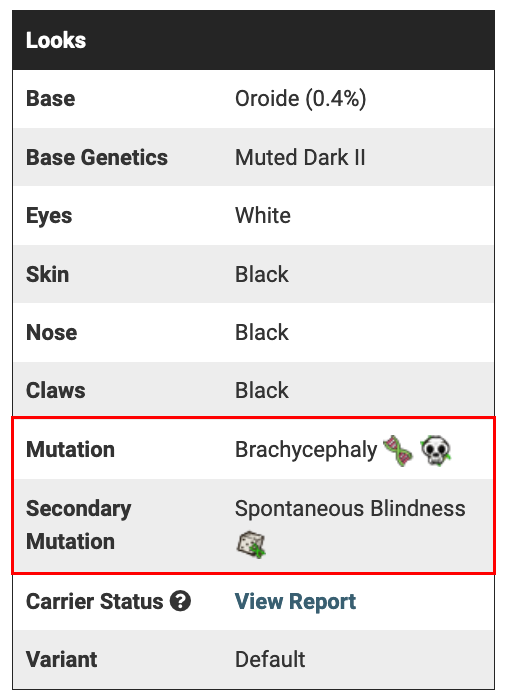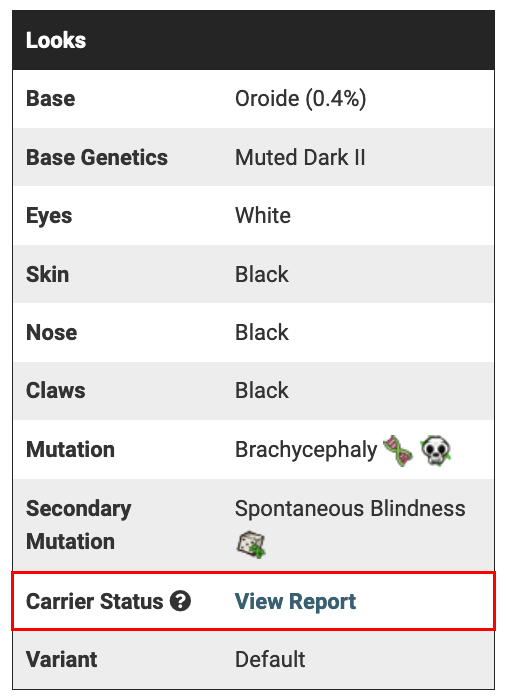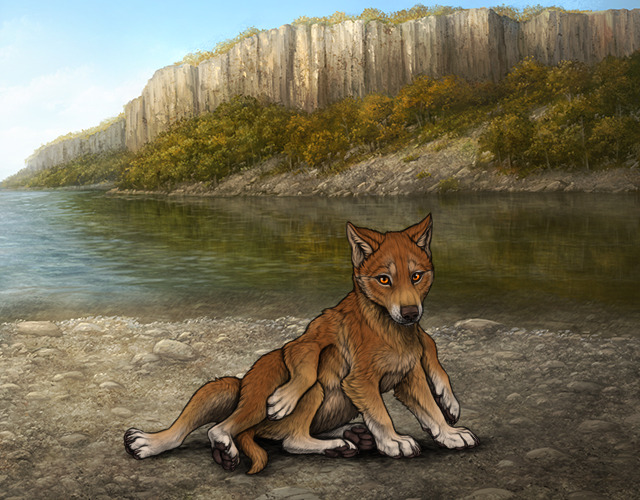Mutations
From Grouse House Wiki
Mutations are a rare mix-up in a wolf's genetics that make them more unique! Not all wolves have mutations, but those that do may be more valuable or more visually distinct than other wolves.
Wolvden's mutations system is elaborate and varying! There are multiple different types of mutations, each obtained through different means, and even an ability for mutations to stack. With this in mind, there are many different methods to obtaining a mutation and a wide range of demand and market values.
Mutation Basics
Mutation Basics
There are multiple aspects of a wolf's mutation status that can be complex to understand, but we will break each part down here!
You can find details about a wolf's mutations, if any, under the Looks section of their profile page. Here, you'll find a Mutation section, a Secondary Mutation section, and a Carrier Status section. Mutation and Secondary Mutation provide information on mutations that wolf actively possesses, while Carrier Status informs about mutations a wolf has the capability of generating through breeding.
Mutations and Secondary Mutations
Mutations and Secondary Mutations
Each wolf has two slots available for mutations, the Mutation and Secondary Mutation slots. This means that a wolf could have two mutations simultaneously! However, not all mutations can be doubled up.

Mutations are defined specifically as a "Mutation" or "Secondary Mutation", specifying which slot it will take up. Large, lineart-changing mutations like Brachycephaly are most frequently in the "Mutation" slot. Meanwhile, mutations that have more of a layering effect or have no visible effect, like Albinism or Deafness, will take up the "Secondary Mutation" slot. There is no current scenario where a mutation will be able to take up the slot that it is not typically assigned to.
A wolf cannot have two "Secondary Mutations" or two "Mutations" at the same time. For example, you will never have a wolf with Polycephaly and Sirenomelia, as these both take up the "Mutation" slot. Similarly, you will not have a wolf that simultaneously has two types of Piebald, since all Piebald mutations are "Secondary Mutations".
Any two mutations that fill the Mutation and Secondary Mutation slots separately can be doubled up, just not two that would share the same categorization! So, you could have a Brachycephalic wolf with Melanism, a Polycephalic wolf with Deafness, or many other combinations!
From the list below, you can pair any "Mutation" or "Secondary Mutation" together, and that combination is possible on a wolf in-game!
| Mutation Categories |
|---|
| Mutations |
| Brachycephaly |
| Conjoined Twins |
| Polycephaly |
| Polymelia |
| Sirenomelia |
| Secondary Mutations |
| Albinism |
| All Patches |
| All Piebalds |
| Deafness |
| Hereditary Cataracts |
| Melanism |
| Spontaneous Blindness |
Carrier Status
Carrier Status
Another value informing of a wolf's mutation status is Carrier Status. This trait relates to Genetic Mutations, mutations that can be passed from parents through recessive genes. We'll discuss this type of mutation further down on this page.

In order to reveal a wolf's carrier status, one must pay for the wolf to be analyzed at Gene's Hollow. Here, Gene will take Silver Cones in exchange for revealing if a wolf is a carrier for any of the four current genetic mutations. After it's been revealed by Gene, the wolf's Carrier Report will be updated to reflect the results.
If a wolf has never been carrier tested for any mutation, their Carrier Status will display as "Unknown" with a link to Gene's Hollow. Otherwise, you will be able to select View Report to view the wolf's status for each genetic mutation.

In a wolf's carrier report, you'll find four possible statuses for each mutation. If a wolf has a genetic mutation, they are not considered a carrier, but they will still have the ability to pass the mutation to pups.
You can learn more about genetic mutations, carriers, and recessive genes in the Genetic Mutations section of this page.
Types of Mutations
Types of Mutations
Mutations can be assigned four different categories depending on their method of obtention and effect on the wolf.
Random mutations are mutations that appear randomly in any breeding, without any prerequisite.
Genetic mutations are passed through recessive genes, and parents must have the gene or mutation for their pup to get the mutation.
Applicator mutations can be applied to any wolf using an applicator, and pups can only get the mutation if their parent has it.
Finally lethal mutations can be random or genetic, and are characterized by causing a pup's death before they can reach adolescence. The lethal categorization is secondary on top of the mutation being random or genetic.
When a wolf has a mutation, you will be able to view that mutation's categories on the wolf's page under the Mutation or Secondary Mutation fields. Each category will display a different icon.
| Icon | Meaning |
|---|---|
| This is a random chance mutation | |
| This is a recessive genetic mutation | |
| This is an applicator mutation | |
| This is a lethal mutation |
We will go into detail on each type of mutation below!
Random Mutations
Random Mutations
Some mutations have the chance to show up randomly in any breeding. The chance, however, is very very low! You could breed hundreds or even thousands of pups and not run into a random mutation!
There are some ways to increase your chance of getting a random mutation. The mother having a lower fertility will provide a small boost, as per the unique quest The Next Generation. Additionally, you may opt to use a Wolf Meat item, purchasable during the Halloween event. This item will provide a higher chance for a puppy in the wolf's next litter to have a random mutation.
There are currently six possible random mutations, listed below.
| Random Mutations |
|---|
| Conjoined Twins |
| Deafness |
| Polycephaly |
| Polymelia |
| Sirenomelia |
| Spontaneous Blindness |
Genetic Mutations
Genetic Mutations
Genetic mutations are produced by hidden genes present in some wolves, called carriers. Hidden genes are always recessive, meaning that both parents must have the hidden gene for a chance for a puppy to develop the mutation. Since you can't see hidden genes from the outside, the only ways to know if your wolf is a carrier of a hidden gene is by gene-testing them at Gene's Hollow or breeding them to another carrier.
Hidden genes originate from newly-generated wolves like wolves befriended in explore or created from scratch in the Customizer. Newly-rolled lead wolves, new befriended wolves, and new customized wolves have a very small chance of carrying one of the four possible hidden genes.
Wolves are able to be a carrier of multiple hidden genes at the same time. So, you could breed a line of wolves who carry every hidden gene in the game! The genes are treated as completely separate traits, so they will not interact with each other in any way while breeding.
When breeding a wolf with a hidden gene, there is a small chance that they will pass that gene onto their pup, even if the pup does not get the mutation itself. It's not a guarantee, however, for the gene to pass on. Every genetic mutation has the same pass rates, that we'll list below.
| Genetic Mutation Pass Rates | |
|---|---|
| Non-carrier x Non-carrier | 100% Non-carrier |
| Carrier x Non-carrier | 90% Non-carrier, 10% Carrier |
| Mutation x Non-carrier | 85% Non-carrier, 15% Carrier, 0% Mutation |
| Carrier x Carrier | 80% Non-carrier, 10% Carrier, 10% Mutation |
| Mutation x Carrier | 70% Non-carrier, 15% Carrier, 15% Mutation |
| Mutation x Mutation | 70% Non-carrier, 20% Mutation, 10% Carrier |
There are currently four possible genetic mutations, listed below.
| Genetic Mutations |
|---|
| Albinism |
| Brachycephaly |
| Hereditary Cataracts |
| Melanism |
Applicator Mutations
Applicator Mutations
Applicator mutations are mutations which can be obtained by applying them directly to your wolf using a Mutie on Demand applicator.
Mutie on Demand applicators are obtained during the Black Friday/Cyber Monday Promotion with any $50 purchase or higher. They can be used to apply a specific applicator mutation to a wolf of your choosing who does not already have a secondary mutation.
Besides being applied using applicators, Applicator mutations also have a small chance of being passed to pups through breeding. These are not genetic/recessive mutations. Applicator mutations cannot be carried or passed as recessive genes through generations. A pup will only have a chance of getting an applicator mutation from their parent is if one of their parents has the exact mutation. Though similar, Patches and Piebald mutations cannot pass any other mutation besides their specific shape.
There are currently six possible applicator mutations, listed below.
| Genetic Mutations |
|---|
| Patches: Mottled |
| Patches: Split |
| Piebald: Biewer |
| Piebald: Frontal |
| Piebald: Torn |
| Piebald: Uneven |
Lethal Mutations
Lethal Mutations
Lethal mutations are mutations which will cause your wolf's death after a certain number of rollovers. These mutations are visible from birth and will kill before your wolf reaches adolescence. Lethal mutations could be genetic or random.

When a pup in your pack is born with a lethal deformity, you will receive a message in your daily rollover summary about an "Unusual Puppy". This will describe what is wrong with the pup. Over the course of the next few rollovers, you will receive additional messages detailing the pup's daily life.
